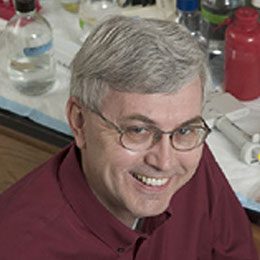Fields of Research
- Drug Discovery & Precision Medicine
- Intracellular Signaling
- Molecular Basis of Disease
Research Summary
Phosphodiesterases (PDEs) are enzymes that regulate the amplitude and duration of the second messenger molecules cAMP and cGMP. Many PDEs were intially discovered and studied in the Beavo laboratory, and many signaling agents that regulate PDEs were discovered by the Beavo lab and include insulin, glucagon, EDRF and many neurotransmitters. Much of the Beavo’s lab work focused on determining the physiological reasons for the existence of so many isozymes and to understand mechanistically how they function.
Research Statement
Many hormones, drugs and other agents modify physiological processes by causing changes in cAMP and cGMP. The amplitude and duration of these second messenger signals are controlled in large part by the activity of the specific cyclic nucleotide phosphodiesterases (PDEs) that control their degradation. The signaling pathways regulated by PDEs include such well known processes as visual transduction and male erectile function. They also include less well known pathways such as regulation of aldosterone by atrial natriuretic peptide and regulation of platelet aggregation by endothelial relaxation factor. Drugs that selectively inhibit individual PDE isozymes have a wide variety of different effects on an animals suggesting specific roles for most of the different PDEs.
There are eleven related but unique gene families that code for different PDEs and that most of these families contain more than one gene. Furthermore, each gene product is differentially spliced in different tissues to yield different isozymes. A major focus of the Beavo laboratory was to determine the molecular nature for the normal control of these isoenzymes. Many of the projects involved approaches to determine which cell types contain what PDE isozyme, and how that particular PDE isozyme contributes to the phenotype of the cell. In addition, crystal structure of several of these isozymes were pursued to understand structure/function of PDEs. Several PDE isozymes are known to regulated by covalent modification, and studies to determine how and to what extent these types of regulation are important to the physiological functions of the cells in which the PDEs are expressed were conducted.
Awards and Honors
1976-1981 Established Investigator, American Heart Assoc.
1980-present American Society of Pharm. & Exp. Therapeutics (ASPET)
1979-1998 NIH, Physiological Chemistry, Biochemistry, Endocrinology, and Pharmacology Ad Hoc Study Section Member
1984-1986 American Heart Association Study Section Member
1984-1987 Editorial Board, Molec. & Cell. Endocrinology
1986-1990 Associate Editor, Molecular Pharmacology
1989-1994 Editorial Board, J. Biol. Chem.
1995-2000 Editorial Board, Pharmacological Reviews
1993-1999 Program Committee, ASPET
1999-2005 Editorial Board PNAS
2000- 2009 Councilor, ASPET
2008- 2009 President, ASPET
1996-present Member National Academy of Sciences

Joseph Beavo
Professor Emeritus
Affiliations
UW Department of Pharmacology
ASPET
National Academy of Sciences
American Heart Association

Joseph Beavo
Professor Emeritus
Affiliations
UW Department of Pharmacology
ASPET
National Academy of Sciences
American Heart Association
Faculty
- Box:
- 357280
Lab
- Box:
- 357280
- Phone:
- (206) 543-4006

Joseph Beavo
Professor Emeritus
Affiliations
UW Department of Pharmacology
ASPET
National Academy of Sciences
American Heart Association
N/A

Joseph Beavo
Professor Emeritus
Affiliations
UW Department of Pharmacology
ASPET
National Academy of Sciences
American Heart Association
N/A

Joseph Beavo
Professor Emeritus
Affiliations
UW Department of Pharmacology
ASPET
National Academy of Sciences
American Heart Association
Select Publications
Analyses of PDE-regulated phosphoproteomes reveal unique and specific cAMP-signaling modules in T cells.
Beltejar MG, Lau HT, Golkowski MG, Ong SE, Beavo JA.
Proc Natl Acad Sci U S A. 2017 Jul 25;114(30):E6240-E6249. doi: 10.1073/pnas.1703939114. Epub 2017 Jun 20.
SCAP/SREBP pathway is required for the full steroidogenic response to cyclic AMP.
Shimizu-Albergine M, Van Yserloo B, Golkowski MG, Ong SE, Beavo JA, Bornfeldt KE.
Proc Natl Acad Sci U S A. 2016 Sep 20;113(38):E5685-93. doi: 10.1073/pnas.1611424113. Epub 2016 Sep 6.
Luteinizing Hormone Causes Phosphorylation and Activation of the cGMP Phosphodiesterase PDE5 in Rat Ovarian Follicles, Contributing, Together with PDE1 Activity, to the Resumption of Meiosis.
Egbert JR, Uliasz TF, Shuhaibar LC, Geerts A, Wunder F, Kleiman RJ, Humphrey JM, Lampe PD, Artemyev NO, Rybalkin SD, Beavo JA, Movsesian MA, Jaffe LA.
Biol Reprod. 2016 May;94(5):110. doi: 10.1095/biolreprod.115.135897. Epub 2016 Mar 23.
Studying mechanisms of cAMP and cyclic nucleotide phosphodiesterase signaling in Leydig cell function with phosphoproteomics.
Golkowski M, Shimizu-Albergine M, Suh HW, Beavo JA, Ong SE.
Cell Signal. 2016 Jul;28(7):764-78. doi: 10.1016/j.cellsig.2015.11.014. Epub 2015 Nov 28.
Roles of cGMP-dependent protein kinase I (cGKI) and PDE5 in the regulation of Ang II-induced cardiac hypertrophy and fibrosis.
Patrucco E, Domes K, Sbroggió M, Blaich A, Schlossmann J, Desch M, Rybalkin SD, Beavo JA, Lukowski R, Hofmann F.
Proc Natl Acad Sci U S A. 2014 Sep 2;111(35):12925-9. doi: 10.1073/pnas.1414364111. Epub 2014 Aug 19.

Joseph Beavo
Professor Emeritus
Affiliations
UW Department of Pharmacology
ASPET
National Academy of Sciences
American Heart Association
